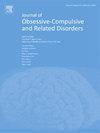Four questions for clarity: A first investigation of the German version of the OCI-4 as an ultra-brief screening tool for Obsessive-Compulsive Disorder
IF 1.5
4区 医学
Q3 PSYCHIATRY
Journal of Obsessive-Compulsive and Related Disorders
Pub Date : 2025-04-01
DOI:10.1016/j.jocrd.2025.100953
引用次数: 0
Abstract
Background
Obsessive-Compulsive Disorder (OCD) is a prevalent and debilitating condition that is frequently under- or misdiagnosed in clinical practice, leading to significant delays between symptom onset and accurate diagnosis. To improve the diagnostic process for individuals with OCD, there is an urgent need for screening instruments that are both syndromally valid and reliable. Accordingly, the current study aims to evaluate the psychometric properties of the German version of the ultra-brief, four-item Obsessive-Compulsive Inventory (OCI-4).
Methods
The psychometric properties of the OCI-4 were investigated in a German-speaking sample composed of 102 participants with OCD, 69 participants with an anxiety-related disorder, and 248 non-clinical individuals.
Results
The OCI-4 showed good test-retest reliability, moderate-to-good construct validity, and good-to-excellent screening accuracy.
Conclusions
The results support that the German version of the OCI-4 is a valid and reliable screening tool for OCD symptoms with good-to-excellent psychometric properties. The OCI-4 could be established as a screening tool in various settings to identify those with likely OCD.
澄清四个问题:对德语版OCI-4作为强迫症超简短筛查工具的首次调查
背景:强迫症(OCD)是一种普遍存在的使人衰弱的疾病,在临床实践中经常被低估或误诊,导致症状发作和准确诊断之间的显著延迟。为了改善对强迫症患者的诊断过程,迫切需要一种既能在症状上有效又可靠的筛查工具。因此,目前的研究旨在评估德国版超简短的四项强迫症量表(OCI-4)的心理测量特性。方法对102名德语强迫症患者、69名焦虑相关障碍患者和248名非临床个体进行OCI-4的心理测量。结果OCI-4具有良好的重测信度、中等至良好的构念效度和良好至优异的筛选准确性。结论德文OCI-4量表是一种有效、可靠的强迫症症状筛查工具,具有较好的心理测量特性。OCI-4可以作为一种筛选工具,在各种情况下识别可能患有强迫症的人。
本文章由计算机程序翻译,如有差异,请以英文原文为准。
求助全文
约1分钟内获得全文
求助全文
来源期刊
CiteScore
4.00
自引率
5.60%
发文量
46
审稿时长
47 days
期刊介绍:
Journal of Obsessive-Compulsive and Related Disorders (JOCRD) is an international journal that publishes high quality research and clinically-oriented articles dealing with all aspects of obsessive-compulsive disorder (OCD) and related conditions (OC spectrum disorders; e.g., trichotillomania, hoarding, body dysmorphic disorder). The journal invites studies of clinical and non-clinical (i.e., student) samples of all age groups from the fields of psychiatry, psychology, neuroscience, and other medical and health sciences. The journal''s broad focus encompasses classification, assessment, psychological and psychiatric treatment, prevention, psychopathology, neurobiology and genetics. Clinical reports (descriptions of innovative treatment methods) and book reviews on all aspects of OCD-related disorders will be considered, as will theoretical and review articles that make valuable contributions.
Suitable topics for manuscripts include:
-The boundaries of OCD and relationships with OC spectrum disorders
-Validation of assessments of obsessive-compulsive and related phenomena
-OCD symptoms in diverse social and cultural contexts
-Studies of neurobiological and genetic factors in OCD and related conditions
-Experimental and descriptive psychopathology and epidemiological studies
-Studies on relationships among cognitive and behavioral variables in OCD and related disorders
-Interpersonal aspects of OCD and related disorders
-Evaluation of psychological and psychiatric treatment and prevention programs, and predictors of outcome.

 求助内容:
求助内容: 应助结果提醒方式:
应助结果提醒方式:


